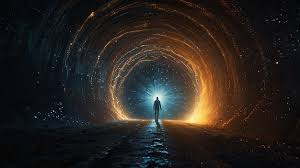Can you travel back to the past? Films say yes, science isn’t so sure

The idea of traveling through time has fascinated humans for centuries. From ancient myths to modern science fiction blockbusters, the concept of bending time to revisit the past or explore the future taps into both our curiosity and our deepest regrets. But while films often make time travel look as easy as stepping into a DeLorean or dialing a quantum device, the reality, according to science, is far more complicated—and far less forgiving.
Time Travel in Pop Culture: A Fantasy Playground
Cinema and television have long embraced the concept of time travel. It’s a creative tool that allows writers to explore alternate realities, fix past mistakes, or warn humanity of impending doom. Iconic films like Back to the Future, Looper, The Butterfly Effect, and Interstellar portray time travel in different, often dramatic ways. In these narratives, the past is not fixed—it’s a place one can visit, influence, and sometimes even completely alter.
Take Back to the Future (1985) as an example. Marty McFly’s adventure shows him altering the timeline by accidentally preventing his parents’ first meeting. The film embraces what’s known as the “grandfather paradox”—the idea that if you change something in the past, it could make your current existence impossible. It’s a compelling storytelling tool, but from a scientific point of view, it opens a minefield of paradoxes.
The Scientific Perspective: Future Travel Is Real, But the Past?
When scientists talk about time travel, they mostly refer to traveling forward in time. This is not just theoretical—it’s been proven. According to Albert Einstein’s theory of special relativity, time slows down for objects moving at very high speeds. This phenomenon, known as time dilation, has been tested with atomic clocks on fast-moving jets and satellites. For astronauts orbiting Earth at high speeds, time technically passes slightly slower than it does for people on the ground. So, in a very real sense, they are traveling into the future.
But going backward? That’s where things get tricky.
Wormholes and Closed Timelike Curves
General relativity—a theory Einstein developed later—offers some hope in the form of wormholes. These theoretical “shortcuts” through space-time could, in principle, connect distant points in the universe. Some physicists believe that if a wormhole’s two ends experienced time differently (due to speed or gravity), a traveler might be able to enter one end and emerge in the past. This forms what’s called a closed timelike curve (CTC).
Renowned physicist Kip Thorne, who advised on Interstellar, explored this idea in serious academic work. However, these wormholes remain purely theoretical. No experimental evidence exists to confirm that they are real or stable, let alone usable for travel.
Paradoxes: The Timeline’s Greatest Enemy
Science’s biggest problem with time travel to the past is logical consistency. The grandfather paradox remains the most cited example. If you were to travel back in time and prevent your grandparents from meeting, you would erase your own existence. But then, if you never existed, who went back in time to prevent the meeting?
Physicists and philosophers alike have tried to resolve these contradictions with various theories. One is the many-worlds interpretation of quantum mechanics, which suggests that every decision spawns a new universe. Under this model, if you go back and change the past, you don’t alter your timeline—you create a new, alternate one. However, this remains speculative, with no way (yet) to test it experimentally.
Stephen Hawking’s “Chronology Protection”
The late physicist Stephen Hawking proposed what he called the Chronology Protection Conjecture. This theory suggests that the laws of physics conspire to prevent backward time travel. In simple terms, even if wormholes or other paths through time could exist, quantum effects might destroy them the moment they become usable for time travel. According to Hawking, this is nature’s way of avoiding paradoxes.
Could We Ever Make It Happen?
Despite the hurdles, the idea of time travel hasn’t been entirely dismissed by the scientific community. Some physicists continue to explore the mathematics of exotic matter—substances that have negative energy and could, in theory, keep a wormhole stable. Others look into the role of quantum gravity, a still-developing field that might eventually rewrite our understanding of space-time.
There’s also ongoing research into whether our understanding of time itself is complete. Some theories suggest that time may not be as linear or one-dimensional as we perceive. If future breakthroughs drastically alter our grasp of time, who knows what might be possible?
But even if a method for backward time travel were discovered, it would raise serious ethical, legal, and philosophical questions. Should anyone have the right to change history? What happens to those affected by the changes? Could time travel be weaponized or abused?
The Bottom Line: Fiction Fuels the Dream, Science Grounds It
Time travel remains one of the most captivating ideas in both science fiction and scientific theory. While traveling into the future (in small amounts) is possible through relativity, traveling back into the past remains—at least for now—beyond our reach. The laws of physics don’t explicitly forbid it, but they make it exceedingly difficult.
So, the next time you watch a character fix the past in a movie, enjoy the drama—but remember that in the real world, the past is stubbornly out of reach. For now, we move forward, one second at a time.






